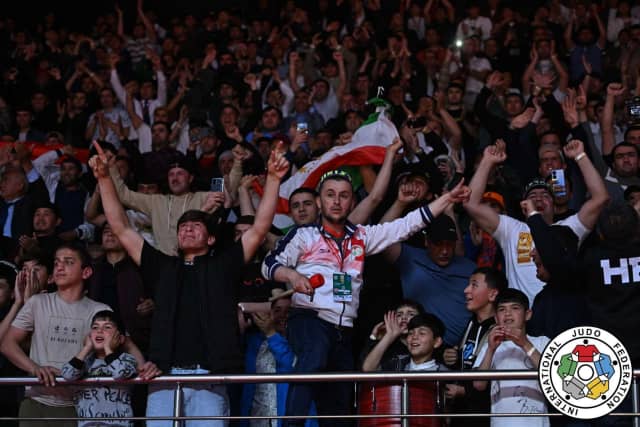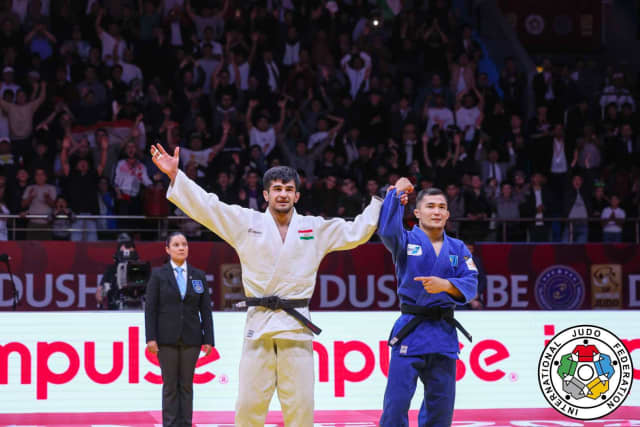The crowd played a crucial role in the event’s success, creating an environment where good judo could flourish. Their energy was infectious and their support for all of the athletes, not just their own, was totally refreshing and arguably elevated the performances of many of the athletes. For example, during the -63kg bronze medal contest between Amina Belkadi (ALG) and Cristina Cabana Perez (ESP), chants of “A-mi-na” echoed loudly around the arena and there were huge cheers when the Algerian eventually won the contest. Several other medallists from outside Tajikistan also remarked on their enjoyment of performing in front of such an encouraging and welcoming audience.
The judo on display was nothing short of spectacular. The whole event was marked by the overwhelmingly positive, attacking and open nature of the contests, and the athletes representing the home team had no small part to play in this. 37 Tajik athletes participated in 71 contests across the three days of competition, of which they won a remarkable 33. Of those wins, only 4 were as a result of penalties and only 5 in golden score, highlighting a strong will to win with attractive judo from the home team. In fact, of all 71 of the contests featuring a Tajik fighter, only 10 were won as a result of penalties and only 8 were won in golden score, demonstrating the openness and positive judo on display from all involved.
Tajikistan matched their medal tally from last year, picking up an impressive 7 medals and finishing fourth in the medal table. The sole gold was won by 22-year-old Muhammadsoleh Quvatov, ranked number 50 in the world going into the event. He defeated all but one of his opponents by ippon, each of his scores coming with a different technique. He also produced an ippon among the best of the tournament, a stunning o-uchi-gari in his semi-final.
There were silver medals for the seeded players Obid Dzhebov, Behruzi Khojazoda and Temur Rakhimov. Dzhebov and Khojazoda applied their ashi-waza and sutemi-waza expertly, while Rakhimov displayed quick thinking in ne-waza. There were also bronze medals for the unseeded Mulorajab Khalifaev, Muhammadjon Abdujalilzoda and Dzhakhongir Madzhidov, all of whom showed great tenacity in defeating a number of higher-ranked opponents.
Several judoka who didn’t manage to make it onto a podium still gave the crowd plenty to cheer for. Hadoq Gulov and Abubakr Sherov each produced highlight reel-worthy ippons in the preliminaries. The former threw in round 2 with a beautiful seoi-nage which he entered from the ‘wrong’ side, while the latter settled his round 1 contest with a swirling uki-goshi. 16-year-old Madina Qurbonzoda, who placed 7th here last year, gave another spirited performance in her round 1 match, taking her opponent into golden score.
All this is to say that the host nation has plenty to celebrate and to be proud of after another incredible event. The future of judo in Tajikistan looks to be very bright indeed, and Dushanbe is quickly becoming a favourite stop on the IJF World Tour, for judoka and fans alike.




